Ljubljana related
STA, 31 May 2022 - The company Nova Obzorja, which publishes weekly Demokracija and web portal Škandal24.si, has a new majority owner. The two-third majority share has been transferred from Hungarian company R-Post-R to NovaTV24.si, the company running the Nova24TV news television channel.
According to data by AJPES, the agency for public legal records, the Hungarian company owned by businessman Peter Schatz, one of the key players in Hungarian PM Viktor Orban's media expansion in the Balkans, is no longer the owner of 65.85% of Nova Obzorja.
As of 25 May, the new majority owner is NovaTV24.si, while the remaining 30.14% is still owned by the Democratic Party (SDS) and 4% by SDS MP Dejan Kaloh.
But based on the share register and other sources, media reported in recent years that three of NovaTV24.si's largest owners were Hungarian companies associated with Orban and his Fidesz party, which has recently been strengthening its rule in Hungary and spreading its influence in the region.
Reportedly, three largest owners of NovaTV24.si are asset management company Hespereia, financial holding Okeanis and media publisher Ridikul, each owning a 29.3% share. The remaining 12.1% are owned by small shareholders, many of whom are prominent SDS members and people associated with the party.
Hespereia also owns 73% of media company Nova Hiša, the company running web portal Nova24TV. The remaining 27% is owned by small shareholders, many of whom are again prominent SDS members and people associated with the party.
Nova Hiša ownership has remained unchanged for now, and there has also been no reports of ownership changes at NovaTV24.si.
According to unofficial information by portal Necenzurirano, the ownership changes are part of preparations for the sale of the entire media empire associated with the SDS and withdrawal of the Hungarian capital.
The Hungarian financing of these media outlets has been the subject of parliamentary inquiries in recent years while media reported before the start of the term of the outgoing Janez Janša government that the issue was also being investigated by the National Bureau of Investigation.
STA, 18 February 2022 - Prime Minister Janez Janša will meet his Hungarian counterpart Viktor Orban in Lendava on Monday to sign an agreement on cooperation in the development of the regions with mixed Slovenian-Hungarian population, Janša's office confirmed on Friday. Bilateral relations will also be discussed, the office said.
The meeting was also confirmed by Budapest, with the Hungarian press agency MTI reporting that the PMs will sign an agreement to set up a joint fund for the development of Prekmurje and Porabje, the border regions populated by the Hungarian and Slovenian ethnic minorities.
Janša and Orban are to talk about ways to encourage economic and social development of the two regions with the signing of the agreement in Lendava being the main event of Orban's visit.
Based on the agreement, a development programme will be formed securing additional funding in the 2022-2026 period for promoting economic development and minority media, cultural and education institutions.
As part of the visit, Education Minister Simona Kustec and Hungarian Deputy Foreign Minister Levente Magyar will sign an agreement on cooperation in education, culture and science for the 2022-2025 period.
According to Janša's office, the Slovenian government stresses the need for improving the material situation of the Slovenian community in Porabje.
Young generations in particular need to be given opportunities to preserve the language and culture of their community, and find job and business opportunities in their local environment, it said.
Slovenia and Hungary have had intensive dialogue on all levels, which was confirmed when the two countries' governments met in Celje in September 2021, the prime minister's office said.
Economic cooperation has also been picking up, as Hungary is Slovenia's seventh most important trade partner.
Slovenia has been implementing development programmes in areas inhabited by the Hungarian ethnic minority since 2017, while Hungary launched a development programme in Porabje in 2020.
STA, 11 February 2022 - The International Press Institute has a released a report on Hungarian investments in foreign media that suggests the Hungarian model of government control of the media is being transposed to Slovenia, which it says is important in light of Slovenia's upcoming general election.
The report says that after subjugating media at home, the Hungarian government, aided by companies controlled by its political allies, has started building a media empire in Slovenia and North Macedonia that is supposed to "act as megaphones for its regional ideological allies."
Both Slovenia and North Macedonia have thus seen in recent years an inflow of Hungarian investments in media, either in media serving Hungarian national minorities in several countries, or media connected with Hungarian Prime Minister Viktor Orban's ideological allies.
Such investments - the most notable examples in Slovenia include the TV channel Planet TV, publisher Nova Obzorja and TV station and news portal Nova24 - raise serious questions about the exporting of Fidesz's model of illiberal democracy to countries in Hungary's neighbourhood and beyond, the report says.
And while Fidesz politicians insist such investments are purely commercial, IPI says the evidence suggests that they are "rather part of a broad political strategy of influencing media and supporting ideological allies of Fidesz," in Slovenia's case Prime Minister Janez Janša.
The report, available at https://ipi.media/wp-content/uploads/2022/02/hu.pdf, was written in collaboration with independent investigative reporters and leans heavily on Slovenian investigative journalism portals.
With the election of Joe Biden as the 46th President of the United States, Politico looks at the European leaders set to win and lose from the what appears to be a landslide victory for the Democratic candidate and a humiliating defeat for one-term President, all-time loser, Donald Trump, who will leave office in January 2021 to face allegations of fraud and sexual assault, as well as looming personal bankruptcy.
Among the winners it puts Germany’s Angela Merkel, Denmark’s Mette Frederiksen, and France’s Emmanuel Macron, while among the losers, those set back by the solid repudiation of chaos, culture war and open corruption, are said to be the UK’s Boris Johnson, Hungary’s Viktor Orbán, and Slovenia’s own Janez Janša.
It’s pretty clear that American people have elected @realDonaldTrump @Mike_Pence for #4moreyears. More delays and facts denying from #MSM, bigger the final triumph for #POTUS. Congratulations @GOP for strong results across the #US @idualliance pic.twitter.com/vzSwt9TBeF
— Janez Janša (@JJansaSDS) November 4, 2020
PM Janša, whose very active Twitter feed is still alive with allegations of fraud and conspiracy in the US elections, as well as dire warnings of fascism coming to America under the guise of liberalism, is noted for his premature and utterly baseless congratulation of Trump on winning a second term, as well as his claim that Biden “would be one of the weakest presidents in history”.
We respect difficult, tragic personal life of @JoeBiden and some of his political achievements years ago. But today, if elected, he would be one of the weakest presidents in history. When a free world desperately needs STRONG #US as never before. Go, win, @realDonaldTrump ????
— Janez Janša (@JJansaSDS) October 23, 2020
Slovenian prime minister congratulates Trump victory despite inconclusive election https://t.co/rc17OnbvBp
— The Washington Times (@WashTimes) November 4, 2020
So far, other stuff I’ve been seeing from far-right politicians is a bit more circumspect than Janša: Many saying Trump is doing better than expected, or that his message is clearly resonating with many Americans etc. But haven’t seen others preemptively congratulating him so far pic.twitter.com/nPkiyHtPGL
— Emily Schultheis (@emilyrs) November 4, 2020
You can read the full report here, while the usual entertaining analysis of the Slovene scene is available from Pengovsky
STA, 1 September 2020 - Prime Minister Janez Janša held talks on Tuesday with his Hungarian counterpart Viktor Orban. They discussed "close all-around cooperation" between the two countries.
The prime ministers expressed strong support for the respective minorities on both sides of the border and called for stronger cooperation in a variety of bilateral projects.
They also "highlighted the importance of strategic cooperation in the Central European area," Janša's office said.
Janša gave Orban a special commendation and medal for his efforts in fighting Covid-19, and thanked him for Hungary's selfless help and solidarity during the coronacrisis.
Speaking to Hungarian press agency MRI, Orban said that he and Janša agreed the two countries would strive for good neighbourly relations but that it would take a few more months before a concrete plan emerged.
The basis for such a plan will be each country's support for their respective minorities, he said, adding that the bedrock of ties was also the aid Hungary provided to Slovenia during the coronavirus epidemic.
Orban said the tone of Hungarian-Slovenian relations was much more positive than ever before, according to MTI.
The meeting was held a day after Orban attended the Bled Strategic Forum, at which he participated in the leaders' panel along with Janša and several other Central and Eastern European leaders
All our stories about Orban and Slovenia
Janša Pledges to Fight “Cultural Marxism” in Online Discussion with Orban, Vučić on Future of Europe
In an online event called Europe Uncensored: European Leaders on the Future of Europe, organised by the Foundation for a Civic Hungary, Slovenian PM Janez Janša joined with Hungarian PM Viktor Orban and Serbian President Aleksandar Vučić in addressing what they believe are Europe's greatest challenges of the day.
In short, according to Janša and Orban these seem to be mainly the “progressive liberal leftists”, as Orban has called the ideological problem one needs to fight on the inside, or “Cultural Marxism” as Janša has called the same thing, while on the outside the EU is facing immigration and other external threats. Vučić joined in by calling for the mutual respect of differences among the European countries and offered the Serbian army to join the prospective European armed forces.
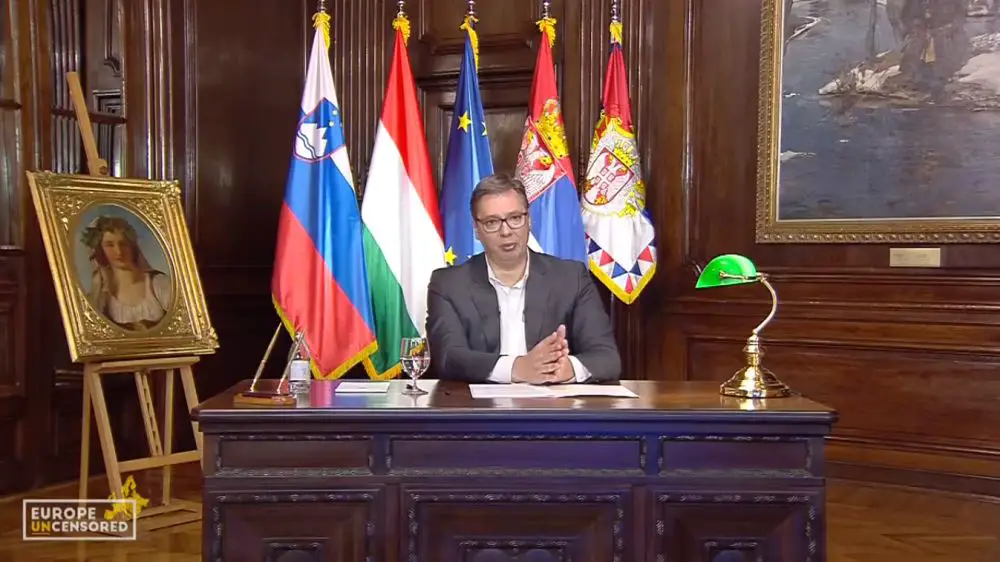
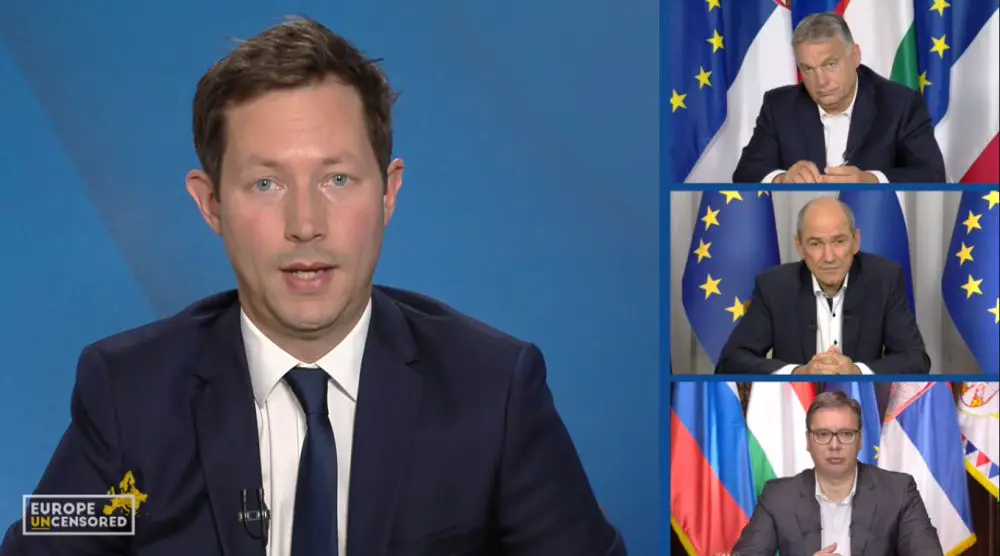
The event’s moderator, the French philosopher, MEP and Deputy Mayor of Versailles. François-Xavier Bellamy, opened with a conceptual progression from the End of History towards the Clash of Civilizations, before the “special club of freedom fighters”, as Orban referred to the group, followed with a speech by Vučić, then Janša and finally Orban, the organiser of the event.
Orban however did not really organise the event himself, as he corrected his fellow participants after they thanked him for his efforts, and explained that the event was organised by the Foundation for a Civic Hungary , and he only contributed the names of the speakers he considered worth listening to.
The online meeting was also advertised on the official government website of the Republic of Slovenia, where the Slovenian translation of Janez Janša's speech with a commentary was also subsequently published. The speech of the Slovenian PM should therefore be understood as the official position of the Slovenian government.
Predsednik vlade @JJansaSDS: "Vse izzive lahko zmoremo, če se bomo vrnili k našim vrednotam. Boriti se moramo za našo identiteto, za ljudi, za našo dediščino, za našo svobodo, za naš način življenja, kajti to bo naša prihodnost."#EuropeUncensored pic.twitter.com/WFPpvgmmXL
— Vlada Republike Slovenije (@vladaRS) July 8, 2020
Janša: Golden Age of Dreams of a Whole and Free Europe
Janša began with a statement of Brexit being a “strategic catastrophe” that threw Europe out of its balance of power. The future of Europe therefore, according to him, depends on the solution to the question of the balance of power.
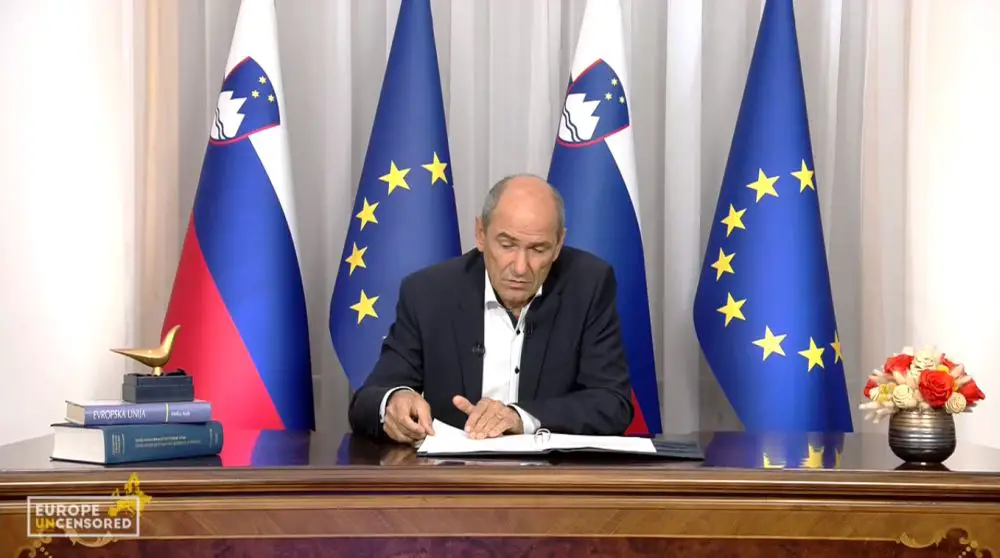
He then described what he calls “the golden era”, the enlargement period when everybody was optimistically speaking of Europe being whole and free, the era of “leaving the old world behind during the democratic changes”.
Then, however, the reality struck and among the “challenges” we are facing today Janša lists problems with the adoption of the EU constitution, the financial crisis, 2015 migrant crisis and the latest Covid19 epidemic. These issues pointed to some “unfinished projects” within the EU and the inability of various institutions to tackle them.
Mishandling of the migration crisis in 2015 contributed a certain percentage of votes in support of Brexit, concludes Janša, offering a possible cause for the “strategic catastrophe” he opened his speech with.
Janša : Institutional Changes Should Not be Europe’s Greatest Priority
Institutions, international in this case, also failed us in the current pandemic. For example, continued the Slovenian Prime Minister in his speech, global institutions such as the WHO, which have been created to prevent such things, were caught completely unprepared and for several weeks the European Union looked as if “in the Middle Ages”, with fences, walls and curfews, confiscations of medical equipment, without any real cooperation in place. The crisis is not over yet and the only way to avoid another lockdown is to focus on measures that work. We can only maintain our relatively normal lives by an introduction of app to monitor the spread of the virus, one app for the whole continent first, then perhaps one for the entire world if there is still no vaccine available.
This is no time on having big dreams about European institutions, Janša claimed, as this would create new instabilities. We need to stabilize the EU, we need realistic pragmatic steps forward.
Janša then proceeded with a proposal that gave Vučić’ membership in the “freedom fighters’ club” some substance. The Schengen border should extend to match the borders of the EU and the EU should expand and incorporate the Balkan countries who would like to join it. “This is the strategic answer made by Brexit and the fulfilment of the promise to make Europe whole and free.”
Janša: The Main Threat to Europe is “Cultural Marxism”
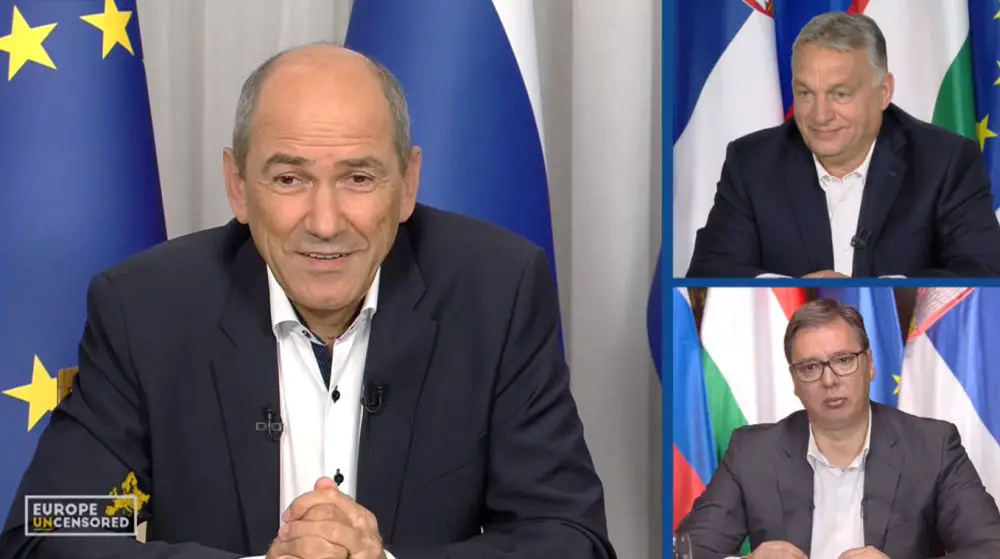
Following his dismissal of the institutional changes being the main field in which we could tackle the problems of today, Janša then moved to the core point of his speech.
“Ideologically, the main threat to Europe is Cultural Marxism. I have been following what has been going on and I can clearly see the same formula, which was written in Communist Manifesto, written 200 and some years ago. To create a new world you need to dismantle family, private property, private schools, religion. And this is going on now. And it is obvious, there is massive offensive going on through mass media, universities, cultural industry, multinational institutions, some political parties. Everyone who stands against it is called a fascist, populist and heavily attacked from all sides. And we need a more united front against this, because this is the key issue, this is a battle for our way of life, this is the battle for Western civilization and in this battle much more is at stake than institutions only or EU only.”
According to Janša, the main problem within this “battle for Western civilization” is the demographic issue, as “if there are no Europeans, if there is no population which is sharing our values then everything is lost”.
With regard to immigration policy, Janša stated that he is against the migration policy as a “final solution” to the demographic problems of Europe. Immigration can only be treated as a demographic complement, since “cultural, economic and security considerations of migration need to be taken into account” or else the consequences can cause problems for all the partners inside of the European Union.
Janša: European Values are values of the European Christian Democrats
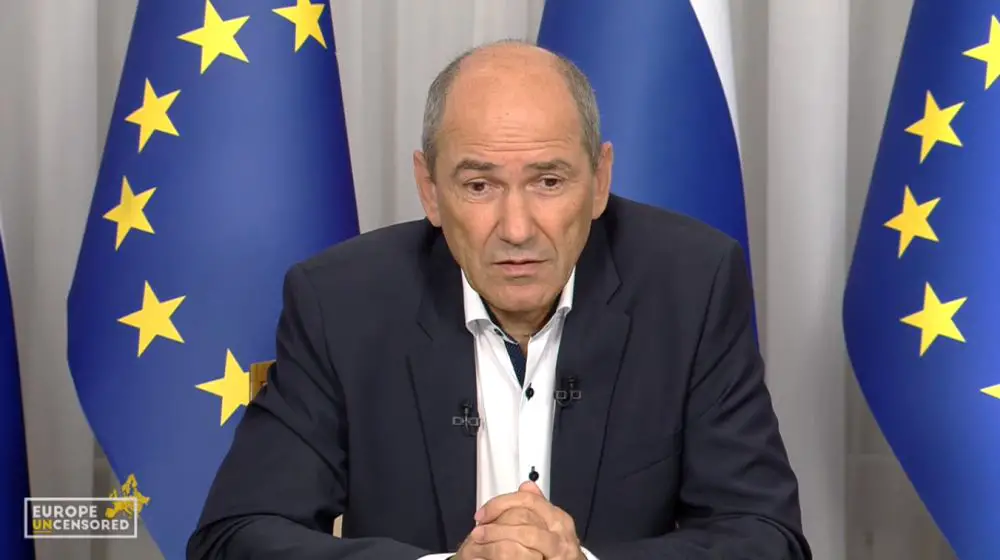
If some ideas can be too old, others are never old enough in Janša’s search for an appropriate origin. Borrowing the term from the 18th century, when the world was ruled exclusively by men, and inserting it into the 20th century Europe, Janša stated that “the founding fathers, which were all Christian democrats” created the European Union in order to prevent the sad history from repeating itself. The European Union was created as a union of values, he said, and continues that it was the success of the early years of the European project which provided the “free world” with the power needed to dismantle the Iron Curtain and Berlin Wall, thereby allowing for the unification of Europe.
This process has not yet been completed, warns Janša, and finds the answer to European problems in returning to the original European values, and then to “fight for our people, for our nations, for our freedom for our way of life and for our future” which is a “noble challenge” of today’s “European central right, the Christian Democrats”.
Although all three speakers emphasized the importance of respect for political and ideological differences, little space for understanding respect as a two directional position was left after Orban’s speech in which he praised Janša as “the bravest anti-Communist in Europe”.
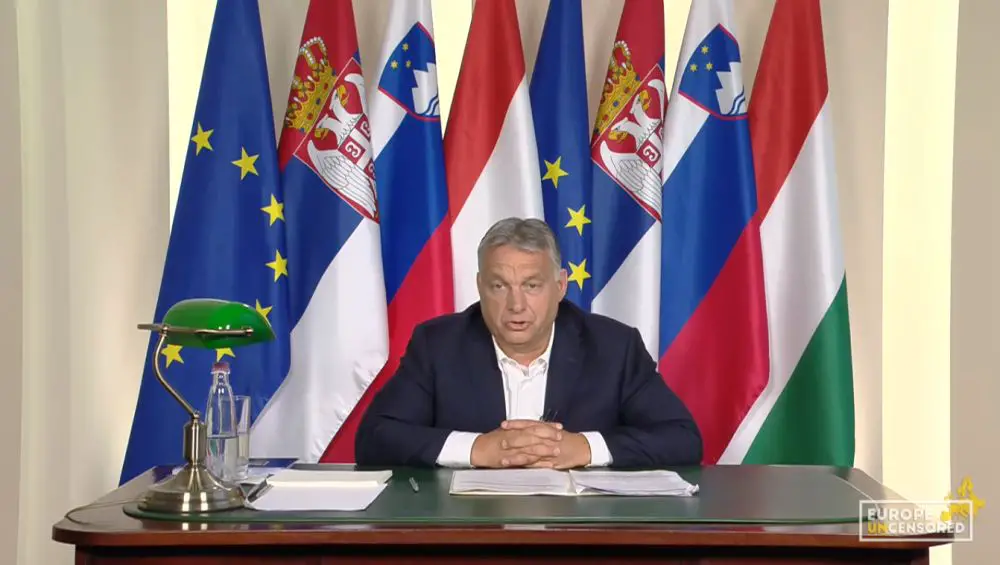
Orban’s main concern was in Europe’s “retreat”, a statement he supported with data showing a decline in Europe’s global relative economic output, population and military spending. Furthermore, Orban repeated the “balance of power” issue, which has been dramatically changed by Brexit with Germany sitting on the European throne again after it was “bombed into the Middle ages 75 years ago.” And thirdly, European politicians have a tendency to tell others in the world how to run their countries while they cannot even solve their own problems at home.
As for the solutions at hand, Orban cited two contesting socio-political models, “conceptions of Europe” which are the “progressive liberal leftist” in which “they promote multiculturalism, they are pushing over pro-migration policy, they follow an anti-family policy, they want to get rid of the concept of nation and nation state and they consider irrelevant the Christian social teaching”. The other conception of Europe is the opposite image of the first and is, albeit not without traitors, according to Orban, the ideological foundation of the European People’s Party (EPP). That is “a concept of the future of Europe, which is based on Christian culture that we have inherited, which cherishes the Christian social teaching, deeply anti-communist, pro-family, and it treats national identity as a value, which needs to be preserved.”
So with these two contesting “conceptualisations” within Europe, what can we do, asked Orban, having such differences, how can we stay together?
In an answer to this question, Orban then made a great leap forward and suddenly ascribed the previously discussed internal ideological division to an external attack on sovereign states: “the West should not impose its views on the Eastern countries. We need to learn to tolerate our differences again. We the Central Europeans should not go and tell the Westerners how they should go and run their countries. So if we are ready to accept that kind of differences even in terms of the vision of the future we can manage to live together and keep together the Union as a whole.”
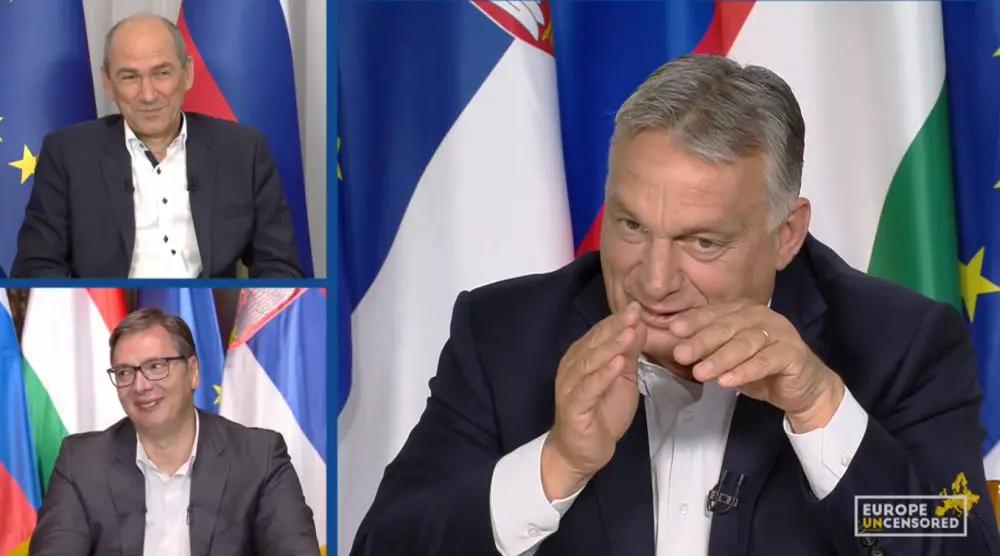
In case someone is still missing the function of the reiterated issue of the change in balance of power within the EU, Orban concluded his speech emphasizing the importance of the European grand strategy over the minor matter of human rights. To the problem of who then is to be the one to design the European grand strategy? “On the birthday of the EPP i wish it was the EPP to be the one.”
The full event is available here.
STA, 7 July 2020 - National telco Telekom Slovenije signed a contract on Tuesday with Hungarian media company TV2 Media selling Planet TV, its subsidiary which produces the eponymous TV channel. TV2 Media will pay EUR 5 million for the 100% share, Telekom said in a press release. The deal is expected to be finalised by autumn.
Today's development confirms the previous media reports on the sale and the value of the deal.
Telekom's supervisors have already given the green light while all the other approvals are expected by the end of September.
TV2 Media is owned by Jozsef Vida, whom media associate with the business network of the Hungarian ruling party Fidesz. Speculation that TV2 is eyeing Planet TV started in early June, when reports also mentioned Croatian entrepreneur Ivan Ćaleta as a second candidate.
The news portal Necenzurirano.si also reported about unofficial plans to merge Planet TV and Nova24TV, the news portal and website associated with the ruling Slovenian Democratic Party (SDS) and also in the ownership of Hungarian individuals reportedly close to Hungarian Prime Minister Victor Orban.
Telekom launched Planet TV in 2012 under the then SDS-led Janez Janša government. It was reported that the telecoms incumbent had been looking for a strategic partner which would buy a 49% share in the TV production company already at the beginning of January, only to change its mind later on.
According to the newspaper Delo, Planet TV has cost Telekom Slovenije EUR 80 million in the form of capital injections, advertisements, loans and other services since it was launched in September 2012, and has operated in the red.
The latest blow was the Court of Arbitration of the International Chamber of Commerce ordering Telekom last year to pay a EUR 23 million buyout to Antenna Group, the Greek partner who wanted out of the joint venture.
Telekom, which thus became the sole owner of Planet TV, saw the buyout significantly reduce its profit last year, which reached a mere EUR 1.2 million.
After initially announcing the search for a strategic partner, Telekom said in mid-March that selling the outright stake in Planet TV was also an option.
According to Necenzurirano.si, some supervisors expressed great reservations about the sale at today's session. They argued they had been presented only the Hungarian bid, which was picked as the best by the Telekom management and a financial consultant.
Several bids had reportedly arrived, with the second and third best bidders allegedly offering only one euro for the company.
Unlike the other bidders, the Hungarians reportedly received an assurance from Telekom that it would continue to advertise on Planet TV. Telekom reportedly also pledged to turn EUR 30 million in loans into Planet TV's capital before the sale is completed.
Telekom also allegedly plans to write off some EUR 3 million in business claims and contribute another million to help keep Planet TV afloat.
The portal also says that Hungarians could extend the sales procedure until the end of the year, but in that case Telekom would have to transfer another EUR 2 million to cover Planet TV's loss.
All our stories on Slovenia and Hungary are here
STA, 30 June 2020 - The state-owned telecoms company Telekom Slovenije has reportedly sold its troubled subsidiary Planet TV to the Hungarian free-to-air channel TV2, owned by Jozsef Vida, whom media associate with the business network of the Hungarian ruling party Fidesz.
The unofficial news was broken on Tuesday by the editor of the news portal Požareport, Bojan Požar, who wrote that Planet TV, which produces the eponymous TV channel, has been sold for EUR 5 million, with the transaction still outstanding.
Telekom Slovenije, which launched Planet TV in 2012 under the then Janez Janša government, has not confirmed or denied the report.
Speculation that Hungary's TV2 was eyeing Planet TV started in early June, when reports also mentioned Croatian entrepreneur Ivan Ćaleta as a second candidate.
It was reported that the telecoms incumbent had been looking for a strategic partner which would buy a 49% share in the TV production company already at the beginning of January, only to change its mind later on.
According to the newspaper Delo, Planet TV has cost Telekom Slovenije EUR 80 million in the form of capital injections, advertisements, loans and other services since it was launched in September 2012, and has operated in the red all the time.
The latest blow was the Court of Arbitration of the International Chamber of Commerce ordering Telekom last year to pay a EUR 23 million buyout to Antenna Group, the Greek partner who wanted out of the joint venture.
The telco, which thus became the sole owner of Planet TV, saw the buyout significantly reduce its profit last year, which reached a mere EUR 1.2 million.
After initially announcing the search for a strategic partner, Telekom Slovenije said in mid-March that selling the outright stake in Planet TV was also an option.
Planet TV was established by Telekom Slovenije at the time of Janša's 2012-13 government. Telekom also owns news web portal Siol.net, which got a new editor-in-chief after Janša became PM again in March.
Hungarian ownership is meanwhile presently involved in two Slovenian media outlets associated with Janša's Democrats (SDS) - the weekly paper Demokracija and the NovaTV web portal and TV channel.
Al our stories on Slovenia and Hungary
STA, 7 May 2020 - President Borut Pahor and several parties have condemned Hungarian Prime Minister Viktor Orban's posting a photo of a Greater Hungary map, with which he wished Hungarian secondary school students good luck in taking history exams.
Posted on Facebook on Wednesday, the photo shows a globe with Hungarian lands expanding into Slovenia and several other European countries, the territories which Hungary lost with the demise of the Austro-Hungarian Empire after WWI.
"It is understandable and right that the recurring postings of maps which could be understood as an expression of territorial claims are met with rejection and concern by the democratic public and politics, including me as the president of the republic," Pahor told the news portal 24ur.com when asked to comment on Orban's provocation.
He believes "it is because of such attempts that we should make an even greater effort to advocate ... respect and cooperation within nations and among nations".
The president also announced that he would draw this to the attention of his Hungarian counterpart Janos Ader's during an official visit planned for July.
The Foreign Ministry said that just like in the past, it would not comment on historical maps published abroad in different contexts, for instance for the purpose of research, education or exhibition, if they are not related to a clear intention or mention of revisionism.
The Ministry told the STA it "closely follows the contexts or the manners in which such historical maps are used and interpreted".
The office of the prime minister said where were historical maps in government offices, including an 1853 map of Slovenian lands that they say depicts "Greater Slovenia".

Learn more about "Greater Slovenia" on Wikipedia
Social Democrat (SD) MP Matjaž Nemec, the chair of the foreign policy committee, voiced the expectation that Slovenian foreign policy will "react decisively...to show it is not a puppet of the Hungarian regime".
"When Orban, a friend of the ruling SDS, does not even conceal his plans any more. I expect a sharp response from all in government. Now is the time to show commitment to your country," he wrote on Twitter.
The coalition New Slovenia likewise said it expected "Slovenian diplomacy to react appropriately and warn the neighbouring Hungary that such 'history lessons' are unacceptable."
"Let's respect the borders we have today, and let's work to minimise their divisiveness in our shared European future," the party wrote on Twitter.
The opposition Left said in a press release that "such provocations which instigate nationalist feelings must be condemned".
"The Janez Janša government will not do so, because it counts on the help of the neighbouring regime. Its goal is clear: to institute an authoritarian conservative regime modelled on Orban's Hungary in our country."
This is not the first time that Orban posted a Greater Hungary map.
Last June, his office tweeted such a map to mark Hungarian Day of National Unity, commemorating the signing of the Treaty of Trianon, with which Hungary lost over 70% of its territory. In December, he posted a photo on Facebook showing his Fidezs party in a meeting under the same map.
Orban's June 2019 incident was condemned by Pahor, the Foreign Ministry, then Prime Minister Marjan Šarec, and several parties, including New Slovenia (NSi), which is now in government, while Janša's Democrats (SDS) said they would not comment.
STA, 28 February 2020 - The Slovenian web portal Oštro published on Friday along with two more investigative journalism groups in the region a report alleging that a Slovenia-based company was used to launder illegal Hungarian government money and finance media propaganda in North Macedonia.
The story - coming after reports showing entrepreneurs close to Hungarian PM Viktor Orban helped fund Slovenian media with ties to the Democrats (SDS) and Macedonian media associated with the country's VMRO-DPMNE party - is based on an investigation that had been started by Macedonian financial police in 2018.
The file of the Macedonian police, which allegedly acted after receiving a hint from Slovenian colleagues, is also said to contain documents obtained by the Organized Crime and Corruption Reporting Project and shared with its local centres in Slovenia (Oštro), North Macedonia (Investigative Reporting Lab Macedonia, IRL) and Hungary (Direkt36).
The centrepiece of the investigation is a EUR 2.94 million advertising campaign contract signed in 2017 by Hungarian entrepreneur Peter Shatz both on behalf the contracting party, his Slovenian publishing company R-POST-R, and the contractor, Macedonian company Target Media.
Screenshot ostro.si. You can see the story referred to here
Shatz, who has also been heavily engaged in dealings around Slovenian media associated with the SDS, used Target Media to buy the Macedonian Alfa TV and establish the Macedonian web portal ripostmk.com, both of which were publishing the ads stemming from the dubious EUR 2.94 million contract that ran from August 2017 to February 2019.
According to the findings of the Macedonian financial police, the marketing involved products by two small Hungarian companies - one of them purporting to sell olive oil from Croatia's Dalmatia region - that "do not exist on the Macedonian market" and whose import into Macedonia was not recorded before or after the ads were ran.
Moreover, indicating that the value of the contract was overblown, IRL quotes a Macedonian marketing expert as pointing out that the biggest client of a marketing agency in Skopje pays less than half a million euro annually for prime time ads at six TV and radio stations and web portals.
Macedonian police is said to suspect that the funds originated from illegal sources and that the aim had been to "legalise" them through Macedonian companies, meaning that money laundering is suspected.
The investigation is led by the director of the Macedonian financial police Arafat Muaremi, who suspects the money came from the Hungarian state budget.
Muaremi told IRL the police had informed the Macedonian prosecution of its findings in August 2019 but that no indictment had been filed. The prosecution said it was acquainted with the case but failed to explain why no action had been taken.
Muaremi added the investigation was started on the basis of a hint from Slovenian colleagues, who also "informed us that the money came from Hungary". According to Muaremi, Hungarian authorities have "not been willing to talk or cooperate with us in any way".
Slovenian police have not commented, but they did repeat that they had been conducting since March 2018 an investigation "of a suspected criminal offence whose perpetrator is prosecuted ex officio".
The Slovenian web portal necenzurirano.si has reported that this investigation pertains to the contentions EUR 450,000 loan taken out by the SDS in 2017 with Bosnian citizen Dijana Đuđić.
All our stories about Hungary and Slovenia are here





